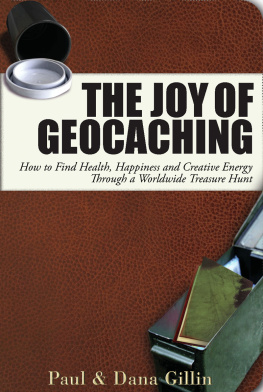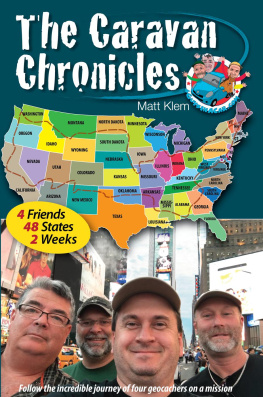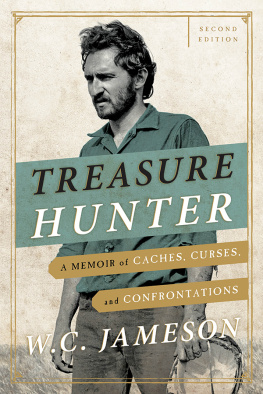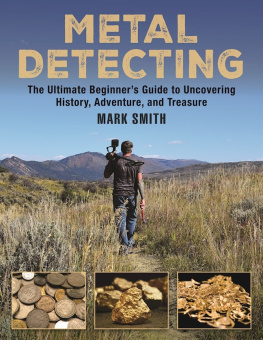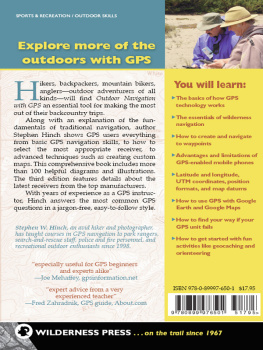101 Devil Caches
Your Guid e to Creating Unique or Hard-to-Find Geocaches!
By
Ej Martin and Kurt Milligan
Copyright 2013 by Ej Martin and Kurt Milligan
All rights reserved. No part of this publication may be reproduced, distributed, or transmitted in any form or by any means, including photocopying, recording, or other electronic or mechanical methods, without the prior written permission of the publisher, except in the case of brief quotations embodied in critical reviews and certain other noncommercial uses permitted by copyright law. For permission requests, write to the publisher, addressed Attention: Permissions Coordinator, at the address below.
Leeward Coast LLC
PO Box 4662
Portland, ME 04112
www.leewardcoast.com
ISBN: 0615752675
ISBN-13: 978-0615752679
Library of Congress Control Number: 2013930474
Leeward Coast LLC, Portland, Maine
Table of Contents
Who We Are
Why We Wrote This Book
How to Use This Book
Authors Note on Safety
A Brief Explanation
The History and Development of Geocaching
Satellites and the Global Positioning System
Capabilities of GPS Devices
Running With the Pack
Geocachers in Profile
Getting Started
How to Find a Cache
How to Hide a Cache
The Cachers CodeEtiquette of the Game
Types of Geocaches
Types of Containers
Man-made Objects
Natural Objects
Puzzles and Challenges
I ntroduction
The phenomenon of geocaching began as an unfamiliar yet emergent hobby barely a decade ago, and now players both hide and seek hidden treasures in nearly every country, terrain, and clime on the planet. Even now, after years of widespread practice and media attention, it remains a relatively unknown and misunderstood activity. There are, however, many individuals and organizations who champion geocaching by means of web sites, public exposure, and through the blogosphereall with the intent of promoting this new collision of traditional sporting and technology.
Our propensity for entrepreneurialism , as well as our devotion to outdoor adventure, quite naturally drew us to the sport of geocaching. We are the proprietors of madcacher.com and navicache.com, two first-rate websites that act as a forum for all things geocaching. Discussions, cache listings, technology updates, blogs, resources, and sales of supplies are among the standard fare we offer.
As the authors of this book, we want to take a minute to tell you a little bit about our backgrounds and what paths of life led to the geocaching trail.
Who We Are
Lifelong Friends
We were both born and raised in Rumford, Maine, about 75 miles north of Portland. Rumford is a small mill town thats nestled alongside cascading waterfalls on the meandering Androscoggin River. Surrounded by lush evergreen forests and within sight of the White Mountains, its tough to think of a more picture-postcard setting for two young boys to explore and have adventures. It was in these Maine woods we learned to appreciate the outdoors and gain an unquenchable thirst for adventure.
Our appreciation of the outdoors and discovery has continued along our career paths. It was only a matter of time before we integrated our d ay-jobs with our love of geocaching. As operators of the madcacher and navicache websites, we get to share our passion and experience with countless other outdoors enthusiasts and geocachers.
Why We Wrote This Book
We both have full time jobs, and those, along with the business of life, really keep us on the go. Geocaching is a love and a hobby that we enjoy putting a lot of time into, but weve also discovered that life must have balance if you want to get the most out of it. Were the type of people that get more enjoyment out of meeting a challenge than just working through the motions. As we found more and more caches, we got the impression people were hiding more cache and dash types of geocaches; those that are easy to find on the go. While we like geocaches like that (especially in winter), we love caches that require us to use our wits or shake our fists in frustration. For some time we have wondered how to not only to share our love of geocaching, but encourage others to build geocaches we ourselves would want to find?
Th e answer? This book, of course! While writing a book like this wont change the hobby of geocaching itself, but it will allow us to connect with more of you and to hopefully spread the word about this hobby that we enjoy so much.
It is our genuine de sire to share our enthusiasm with others and to reinvest the proceeds of this book so that both madcacher.com and navicache.com offer exciting and useful content while providing a valid alternative to some of the larger, more commercialized geocaching sites on the Internet.
How to Use This Book
Like anyone who writes a book, we hope that you enjoy the read and find the information educational or even inspiring to create your own devil caches. We want it to motivate you to raise the bar of creativity and provide other cachers with memorable challenges when they go on the hunt. We also hope youll use this book to introduce friends and family to the charms of geocaching.
The 101 Devil C aches are a combination of ideas weve had mixed with some of the clever and imaginative caching techniques others have developed. We share these with you and encourage you to use our ideas and instructions as a step-by-step guideline or even as inspiration to create innovative caches on your own.
Author s Note on Safety
** We should start by stating the obvious: you use this book, and geocache at your own risk. We as the Authors take no responsibility for your safety or others as the caches you build may impact them. Use your head, take your time and live to cache another day!
It would be awfully tough to think of an outdoor activity where there is absolutely no risk of injury or accident; geocaching is no different. Injuries associated with geocaching range from the ordinary, like getting a splinter, to far more serious concerns such as snakebites and broken bones. On rare occasions, cachers have ended up severely injured or even dead due to avalanches, flash floods, and falling over cliffs.
There are safety risks whenever one works with power tools, chemicals, or other workshop related devices. Its important that everyone keep safe practices foremost in their minds. Wed hate to hear of anyone hurting him or herself while attempting to create any of the Devil Caches contained in this book, or while looking for a cache. With that in mind we offer the following safety reminders.
Safety when Working with Tools and Equipment
Always take precautions, no matter how experienced you are. Wear safety glasses and hearing protection whenever working with power tools or when there is potential for small debris to become airborne. Open windows and doors for ventilation whenever working with chemicals like paint or glue. Handle knives, saws, and other sharp or hot objects carefully, and wear gloves to protect your hands.
Keep a well-stocked first aid kit in your workspace and make sure you know how to treat minor cuts. Likewise, keep a bottle of water nearby just in case you need to flush out your eyes in a hurry. Be smart! Be safe!
Safety when Searching for Geocaches
Read cache write-ups carefully and learn about the environment youll be heading into. Become aware of any potential dangers of the area. Are there snakes, spiders, alligators, bees, ticks, mountain lions, or other potentially harmful wildlife around? What about plants? Poison oak, poison ivy, and cactus are only a few plants to be aware of.
Tell someone where youre going and when youll return. Charge your cell phone before you head out. Drive safely and pay attention to the road or trail more than your GPSr. Remain alert at all times, youre in the wilderness after all. Watch the weather, and dont attempt to climb peaks or walk near ledges if rain or wind is in the forecast. Flash floods are a real danger in the backcountry.
Next page

